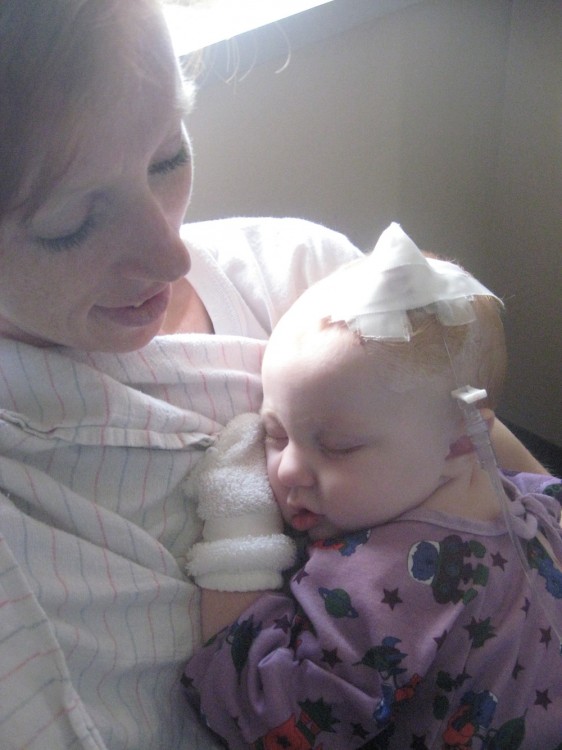When Your Medically Complex Child Is Never Really 'Out of the Woods'
 Parenting is hard. There’s so much to worry about. Throw in complex medical conditions and what’s considered “hard” about parenting changes. The things at the forefront of the mind are different for parents of medically complex children. The stresses of parenting a child without medical conditions certainly exist, and they’re real and valid. For parents dealing with medically complex children, those typical worries still exist, but they have to take a back burner to more basic, primal needs that keep the child alive.
Parenting is hard. There’s so much to worry about. Throw in complex medical conditions and what’s considered “hard” about parenting changes. The things at the forefront of the mind are different for parents of medically complex children. The stresses of parenting a child without medical conditions certainly exist, and they’re real and valid. For parents dealing with medically complex children, those typical worries still exist, but they have to take a back burner to more basic, primal needs that keep the child alive.
The term “medically complex” is a vague umbrella term used to describe a wide range of medical conditions that present unique challenges and require special care on an ongoing basis. There are no official parameters regarding what conditions fall under the umbrella of “medically complex,” but chances are if a child requires ongoing care with a herd of doctors and therapists, he or she is medically complex. Many medically complex children have diagnoses of genetic conditions, diseases of major organs and neurological disorders, and many have a collection of symptoms with no diagnosis.
Parenting a medically complex child means not only providing the usual care and nurturing but also becoming an expert on whatever medical conditions affect the child. It means learning how to operate medical equipment, perform medical procedures, use the various tubes and devices attached to the child and acquire an entire vocabulary of medical terminology. It also means preparing for any of the potential emergency situations that could arise and knowing that danger of these emergencies happening always lurks in life’s shadows.
Parenting a child with any type of special needs changes the way the mind works. The blinders come off, and nothing can ever be looked at the same way. Acknowledging the darker side of life does not make parents of medically complex kids pessimists; it just means they’re doing their best to cope with the often ugly and terrifying realities that accompany their children’s medical conditions. From an outsider’s perspective, it can be difficult to understand that no matter how good a medically complex child looks, he or she may never really be “out of the woods,” so to speak. Medications can keep symptoms at bay, and special diets can help control the damaging effects of disease. Feeding tubes can ensure adequate nutrition and aid in overall health. Insulin pumps can keep blood sugars stable. Congenital conditions can be repaired surgically. All the medical interventions parents of medically complex children learn to administer can keep their children in a state of optimal health for their conditions, but all of that can change at any moment. In the blink of an eye, things can go from calm to complete disaster.
This is why we’re stressed out and why we can’t completely relax. This is why we may find it hard to listen to people talk about the more typical concerns of parenting and why we sometimes seem flaky or uninterested. This is why, no matter how good things are going, we have a hard time not living like we’re waiting for the other shoe to drop. Even when everything appears to be safe, we never feel like we’re out of the proverbial woods because mentally, we can never really leave the woods. It’s all we’ve known since our medically complex children entered our lives, and we can’t erase the memories we’ve made there. We see terrifying and devastating things happen to the friends we’ve met while living in the woods, and we understand those things could happen to us too. Next time, it could be us.
If we seem a little overbearing, overprotective or paranoid, know it’s for a good reason. Just as any parent dedicates his or her life to caring for his or her children, we’ve dedicated our lives to caring for our children, but what that requires of us is different. Living in the woods is not what we planned for our children and certainly not what we wanted for them. Since it’s beyond our power to change that, all we can do is do our best to enjoy the scenery, keep living and create a safe and happy life for them, even if it is in the woods.
This post originally appeared on Feeding Raya.
The Mighty is asking its readers the following: Describe the moment someone changed the way you think about disability and/or disease. If you’d like to participate, please send a blog post to community@themighty.com. Please include a photo for the piece, a photo of yourself and 1-2 sentence bio.
Sign up for what we hope will be your favorite thing to read at night.
